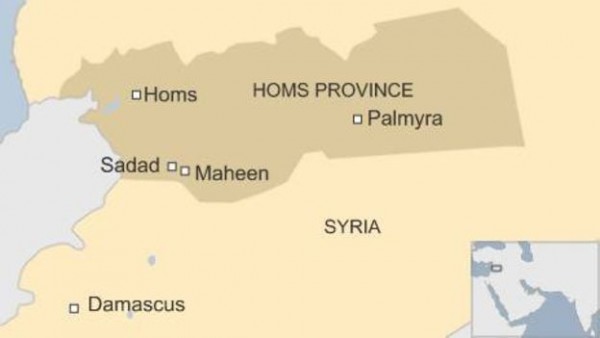Islamic State fighters drove Syrian government forces from a western town on Sunday, a monitoring group reported, as fighting escalated despite a flurry of diplomatic activity and talks between regional rivals.
Syrian parties to the multi-sided conflict said they saw no end to fighting between rebels and the government despite talks in Vienna on Friday that included Iran for the first time.
Iran’s supreme leader meanwhile said elections should be held to end the war, echoing a proposal by Russia that has been dismissed by President Bashar al-Assad’s opponents as a ruse by his allies to keep him in power.
It all underlines the intractable state of the four-year-long war that has killed 250,000 people and driven more than half the population from their homes, causing a refugee crisis in neighbouring states and Europe.
Talks between world powers in Vienna on Friday adjourned with calls for a nationwide ceasefire but key differences remained between rivals backing opposing sides.
The war has entered an even more violent phase in the month since Russia began air strikes in support of Assad. Differences over his future remain the main obstacle in the way of diplomatic efforts.
While the United States and Russia back rival sides in the war between the government and rebels in western Syria, both are also waging separate campaigns against the Islamic State group that controls wide areas of the east and the north.
Islamic State, which is separately fighting both the Syrian army and rebels in western Syria, has launched several attacks on government-held areas since Damascus launched a new offensive against it east of Aleppo, backed by Russian air strikes.
In a fierce assault that began by detonating two suicide car bombs, Islamic State militants took the town of Maheen in the southwest of Homs province from government forces, the Britain-based Syrian Observatory for Human Rights reported.
Some 50 fighters on the government side were killed or wounded, and clashes raged afterwards on the outskirts of a mostly Christian town nearby, Sadad, it said.
Islamic State issued a statement claiming the advance, which brought it within 20 km (13 miles) of the north-south highway linking Damascus to Syria’s other main cities Homs, Hama and Aleppo. Syrian state media made no mention of the attack.
The Observatory’s Rami Abdulrahman said the attack might have been a response to pressures the group is under elsewhere.
On the other side of Syria in the northeastern province of Hasaka, Islamic State is facing a new offensive launched by a recently formed U.S.-backed rebel alliance.
The Observatory reported fierce fighting between the rebel alliance, including the Kurdish YPG militia, and Islamic State fighters in the area of al-Houl near the Iraqi border.
The United States says it will step up its fight against Islamic State in Syria and Iraq, having decided to station special forces in Syria to support rebels fighting the jihadists, and to position more U.S. jets in Turkey and expand air strikes.
Air strikes by Turkish and U.S. aircraft in Syria on Saturday killed more than 50 Islamic State militants, Turkey’s state-run Anadolu Agency said on Sunday.
LONG BATTLE AHEAD
Most of the recent attacks by the Syrian army, which is backed by Russian air strikes and allied fighters from Iran and Lebanon’s Hezbollah, have focused on insurgent groups other than Islamic State.
Several Western military officers attending a security conference this week in Bahrain said that before any political progress can be made, and ahead of new international talks set for within two weeks, rebels and government forces will both look to make gains on the ground and increase their leverage.
A Syrian army source said that Saudi Arabia and Turkey’s continued support for rebels meant battles would not stop.
“The battle is still a long one. All the time support does not stop to the terrorists from regional states, at the forefront of them Saudi Arabia and Turkey,” he said. Syria’s government refers to all rebels fighting it as terrorists.
A prominent rebel leader meanwhile said talks in Vienna on Friday had borne no fruit.
“If Russian-Iranian stubbornness continues, the situation will head toward escalation,” warned Bashar al-Zoubi, head of the political office of the Yarmouk Army, a rebel group operating under the banner of the moderate Free Syrian Army.
The rebels are hoping that regional states including Saudi Arabia and Turkey will increase military support to them.
Saudi Arabia’s Foreign Minister Adel al-Jubeir suggested repeatedly in the past week that support to the Syrian opposition would intensify in the face of Tehran and Moscow shoring up Assad.
At the rare regional talks on security in Manama, he said Riyadh was considering intensifying support to moderate Syrian rebels by providing them with “more lethal weapons”, but gave no further details.
Iranian Supreme Leader Ayatollah Ali Khamenei, in comments reported by Iranian state TV, criticised foreign powers that arm and fund Syrian opposition fighters.
“The solution to the Syrian question is elections, and for this it is necessary to stop military and financial aid to the opposition,” state media outlets quoted Khamenei as saying.
REUTERS


Leave a Reply
You must be logged in to post a comment.